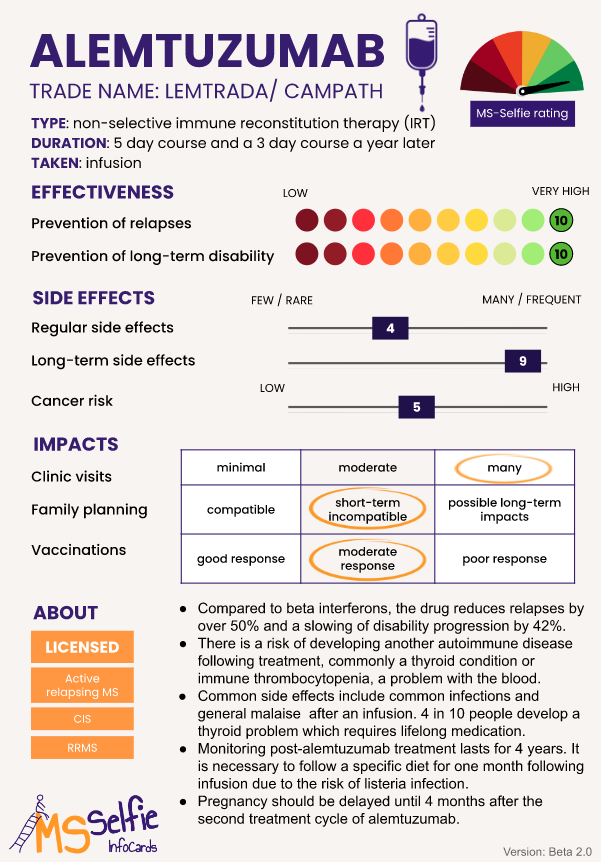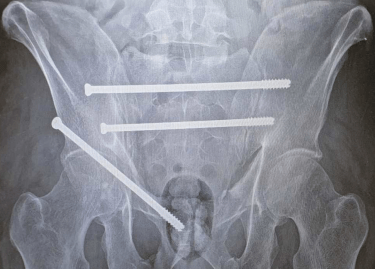Case study
Dear Prof. Giovannoni
I have been recently diagnosed with MS and was offered diroximel fumarate (Vumerity), ofatumumab (Kesimpta) and ocrelizumab (Ocrevus). After reading about these three DMTs, I have settled on ocrelizumab (Ocrevus). However, after reading more about MS and several of your newsletters, I would prefer to be treated with alemtuzumab or cladribine. Why was I not offered these? My consultant prides herself on promoting shared-decision making. How can decision-making be shared if these two options are unavailable to me?

Prof. G’s opinion
I suspect your MS was classified as only active and not highly active (HA) or rapidly evolving severe (RES). Hence, you are likely not eligible for either alemtuzumab or cladribine under NHS England’s algorithm. You should also have been offered interferon-beta, glatiramer acetate, teriflunomide, dimethyl fumarate and ponesimod. All of these are also available on the NHS for treating active MS. I assume your consultant decided against including these to make it easier for you to decide.
I don’t buy into the false division of MS into active, highly active and rapidly evolving severe MS. For someone who has had one attack, why would you wait for a second disabling attack to label them as having rapidly evolving severe MS so they can be offered treatment with alemtuzumab, natalizumab of cladribine? I favour the Australian approach to licensing MS DMTs, i.e. they are licensed to treat MS, and it is up to the neurologist and patient to decide on the best approach to treatment. The current situation in the UK and Europe treats clinicians and patients like fools who need to be told hold to manage MS. If I had MS, I would want to live in Australia.
The fact that you were only offered three DMTs and only two classes of DMTs under the umbrella of ‘shared-decision making’ tells you it is not shared decision-making. The term-shared decision-making is a fudge; it rarely happens, if at all. The sooner we realise this, the better it is for everyone. I prefer guided-decision making, i.e., you guide patients to two or three options based on your professional assessment like your consultant has done with you. Giving people with active MS a choice of over 10 DMTs is confusing, but I think it abrogates your responsibility as an HCP. So yes, I gave up on shared-decision making years ago and called my current practice guided-decision making (GDM).
I have put together a series of questions I would recommend you read before making your treatment decision. These are now beautifully curated on the MS-Selfie microsite, which you kindly pay for with your monthly or annual subscription.
We have also summarised the data in our ClinicSpeak DMT decision aid and the MS-Selfie Info Cards.
You can also download a PDF of the MS-Selfie info cards.
Further reflections on shared-decision making
Several things have made me dump shared decision-making. The first is the complexity of the MS DMT landscape. My patients expect me to take responsibility for their care, not dump complex decision-making on them. After all, I am the expert; in general, patients expect access to my decision-making skills and judgement.
Secondly, I was touched and moved by a perspective written several years ago by Lisa Rosenbaum in the New England Journal of Medicine. It is beautifully written and captures the spirit and mood of the environment we currently work in. After reading the perspective, I realised it was time for unshared decision-making. The following excerpt from the piece captures what I mean.
“In an essay entitled “Arrogance,” published posthumously in 1980, former Journal editor Franz Ingelfinger describes his experience as a patient with adenocarcinoma of the gastroesophageal junction — the area he’d studied for much of his career. As he considered the trade-offs of chemotherapy and radiation, receiving contradictory expert opinions, he and his physician family members became “increasingly confused and emotionally distraught.” Finally, one physician friend told him, “`What you need is a doctor.’” Ingelfinger notes, “He was telling me to forget the information . . . and to seek instead a person who would . . . in a paternalistic manner assume responsibility for my care. When that excellent advice was followed, my family and I sensed immediate and immense relief.”
This happens to me regularly. For example, one of my patients with active MS was deliberating over whether or not she should go onto an immune reconstitution therapy or maintenance-escalation treatment route. She had rapidly evolving severe MS, and I had recommended that we flip the pyramid and start her on a highly-effective treatment, i.e., natalizumab or alemtuzumab. I counselled her and her husband and provided them with all the relevant literature on these two options, and sent her away to make a decision. In hindsight, the latter was a mistake. She spent two months in turmoil about making the right decision. We exchanged numerous emails, and I spoke to her several times over the telephone, and she was still unsure about what treatment option to choose.
After reading Rosenbaum’s perspective, I called her and said I thought she should let me decide on her treatment. She agreed. Given her circumstances that she wanted to start a family in the next few years and had a mother who died of SPMS in her early 50s – I recommended she should go the IRT route. The sense of relief in her voice was palpable over the telephone; she couldn’t stop thanking me for relieving her of the burden of deciding on her own treatment. She had become overburdened with information. Once a decision had been made regarding her treatment, she couldn’t wait to get going; she had no hesitation in choosing the next available slot for her 5-day course of alemtuzumab and subsequently received her two courses without complications. The good news is that the last time I saw her, she was NEIDA (no evident inflammatory disease activity), and she successfully had two uncomplicated pregnancies and is a happy and very proud mother. One of our success stories.
Finally, I had a severe accident in late 2020 and needed urgent surgery to fix my pelvis and cervical spine. On both occasions, I was given a choice about what surgical approach should be taken, and on both occasions, I bounced the ball back into the surgeon’s court and asked what they felt was more appropriate. They decided for me. Why would I, as a neurologist, want to decide what type of surgery I needed? Those interested are welcome to read about my experience in a blog post I did shortly after my accident (‘On the Mend’, 23-Nov-2020).
Have we forgotten our roles as neurologists? I have now changed how I do things, and one of the options on offer is to decide for my patients. The latter, however, is an informed decision and not necessarily a default position. There is a big difference between being paternalistic versus patronising. I hope I practice neurology with the sophisticated intuition Lisa Rosenbaum eloquently describes in her concluding paragraph.
“The doctors I admire most are characterized not by how much they know but by a sophisticated intuition about how best to share it. Sometimes they tell their patients what to do; sometimes they give them a choice. Sometimes, when discussing treatment options, they cover all seven tenets of informed consent. Sometimes, instead, seeing the terror of uncertainty in a patient’s face, they make their best recommendation and say, “I don’t know how things are going to turn out, but I promise I’ll be there with you the whole way.”
Please let me know your thoughts on the issues raised in this Newsletter. If you are on a DMT, were you offered a choice? Did you want your neurologist to choose for you? Do you agree with guided-decision making? Or rather shared-decision making?
Lisa Rosenbaum. Perspective: The Paternalism Preference — Choosing Unshared Decision Making. N Engl J Med 2015; 373:589-592.
Some additional excerpts:
… consent is not merely the granting of permission but an exercise in choosing, and choice requires disclosure of a certain amount of information. How much information is adequate? Rather tautologically, as much as necessary to decide: “The scope of the physician’s communications to the patient must be measured by the patient’s need, and that need is whatever information is material to the decision.”….
… Today, any lingering ambiguity about informational adequacy is rendered moot by the dogma that more information is always better. Patients are exhorted to empower themselves with information to make wise choices, whether selecting hospitals or deciding how they’ll die….
…. Clearly, patients should have access to all available information, from their medical records to anticipated costs of care. But that it’s wrong to deny anyone information doesn’t make it right to always provide as much as possible. Might there, in fact, be such a thing in medicine as Too Much Information?….
…. The spirit of informed decision making reflects the recognition that only patients are experts on their own values. But the resultant approach ironically assumes a value framework not all patients possess. What if, for instance, the patient’s preference is to know less? ….
…. Eliciting that preference is difficult. Most patients, asked whether they wish to be informed, say yes.
Even if they know they don’t want all possible information, our information-as-power ethos may make expressing that preference feel unacceptable. Most critically, the choice to be informed is paradoxically uninformed: you can’t know how much you want disclosed before you know what the disclosure contains and how it might affect you….
…. In the article “On Not Wanting to Know,” philosopher Edna Ullmann-Margalit questions the assumption that rational decisions require the “totality of evidence,” arguing that knowledge about oneself may increase autonomy but reduce welfare. Acknowledging that possessing information carries trade-offs, she emphasizes, doesn’t deny anyone’s right to be informed but rather affirms a right not to be. She suggests we engage in a meta–cost-benefit analysis, before a major decision, of the potential trade-offs of acquiring the information to make that decision…..
…. One challenge is that the benefits of information are intuitive, whereas costs are less apparent. One cost is cognitive overload: more information can lead to worse decisions. In one study, consumers presented with just a few salient points about hospital quality and out-of-pocket costs made better hospital choices than those presented with many parameters….
…. When emotionally overwhelmed, we’re especially prone to such decision traps. We focus more on readily imaginable risks than on more common but less gruesome ones. We’re also sensitive to subtle shifts in information framing: we’re more willing to undergo procedures carrying a 95% chance of survival than those carrying a 5% chance of death. And we tend to be more optimistic about our own health prospects than about others’, which may lead us to choose minimally beneficial treatments. As we strive for ideal informed decisions, can we distinguish emotions impairing information processing from those reflecting enduring values?….
…. But though decision aids may mitigate cognitive and emotional overload, they assume that decisions
will be shared. And as information transfers, so does the sense of responsibility, with potentially paralyzing effects — such as those sometimes seen in relatives of dying patients who’ve decided against resuscitation efforts but are asked about matters like continued nutrition: choosing to stop feeding someone can feel tantamount to starvation…..
…. For the many medical decisions now deemed preference-sensitive, the interplay of volition and willingness to assume risk could profoundly affect public health….
….. But science cannot answer a question at the core of our professional identities: As information-empowered patients assume greater responsibility for choices, do we assume less? …..
Subscriptions and donations
Paid subscriptions to MS-Selfie are being used to administer the Newsletter and associated MS-Selfie microsite, which is now open to all readers. At the request of several readers, I have now added the option of making a one-off donation. To keep this initiative open to all readers, I would appreciate it if those who can afford a subscription to subscribe. For active paying subscribers, thank you; your contribution is much appreciated. Because of the falloff in paying subscribers, I am considering returning to a paywall that will give paying subscribers six months of unlimited access to all newsletters. At the same time, free subscribers will have a wait to access the newsletters later, not as an email, but on the substack site.
General Disclaimer: Please note that the opinions expressed here are those of Professor Giovannoni and do not necessarily reflect the positions of Barts and The London School of Medicine and Dentistry nor Barts Health NHS Trust. The advice is intended as general and should not be interpreted as personal clinical advice. If you have problems, please tell your healthcare professional, who will be able to help you.
















Share this post